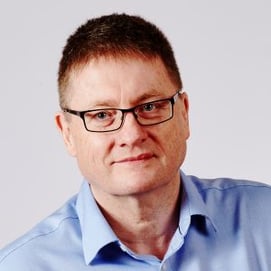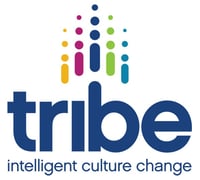
A Day in the Life of a Safety Culture Change Consultant
Colin Hewson talks Human Factors Training, being a good listener and flying business class
Sometimes the work we do as safety culture change experts leaves people wanting to know more. In this series of articles, we’ll chat to some of our culture change Consultants and find out what they get up to. Here’s Colin Hewson, Tribe Lead Consultant, sharing all…
What do you enjoy about working in Safety Culture Change for Tribe?
 Working for Tribe is always a privilege – the range of clients I get to work with and meeting the people who work for the clients. I’m able to get a real insight into the organisation – sometimes more so than if I were part of the organisation – and because I’m external, people often open up. They feel they can be more honest with me.
Working for Tribe is always a privilege – the range of clients I get to work with and meeting the people who work for the clients. I’m able to get a real insight into the organisation – sometimes more so than if I were part of the organisation – and because I’m external, people often open up. They feel they can be more honest with me.
I’ve done lots of work with the NHS and the people are fantastic. I’ve also worked with clients in power generation, housing associations and recently with Canal & River Trust. My experience has taken me down a mine in a Land Rover and into a prison. I’ve also been flown business class to Singapore and back by a client which was nice.
I feel I’m making a difference. In my previous ‘life’, I worked in sport and recreation but my work with Tribe is really preventing people from hurting themselves and others – be it a bump, scrape or getting killed.
And because of the pandemic, mental health is now becoming more of an issue. I saw one woman was working on a bed in a rented room. You’ve got to think about the lack of social contact and the long-term effects physically on the body and the mind.
Delivering Human Factors Training
To give you feel for what I do, I’ve recently been working with an aviation client to deliver a Human Factors Continuation Programme. It’s a regulatory requirement from the Civil Aviation Authority so people must attend.
One of the reasons this client chose to work with Tribe was because of the blend of art and science we apply to developing our workshops. We know it’s vital to appeal to both the rational and emotional side of an individual, so the session we developed had a good balance between theory and story and the client liked this approach.
What is Human Factors Training?
Human Factors Training is about unlocking why people do what they do. When exploring health and safety, no one ever sets out to hurt someone but why do people make certain decisions or behave in a certain way? Is it because of the systems and the organisation or because of outside influences?
People make safety happen for organisations, for leaders balancing a range of priorities. People are the solution to the problems we face. And people can be a symptom of the problem, but rarely the reason.
 What do you cover in Human Factors Training?
What do you cover in Human Factors Training?
As part of the workshop, in small groups we discuss what human factors means to people. I’ll provide a range of human factors (e.g. training, process, shift patterns, communication, lack of knowledge, assertiveness, distractions, tiredness, stress and commercial pressures) and we’ll discuss how these impact people’s decision making.
Central to the session is a realistic scenario (this is where the power of story comes in). We work through the case study by analysing the characters and the evidence. We look at the links, how situations can be avoided, and get participants talking about the culture in the organisation.
This specific client had a code about how to talk to each other respectfully and become a high performing organisation. The workshop explored this by having 20 tiles featuring the code. Examples included ‘being here now’, ‘staying curious’, ‘not accepting things as they are’ and ‘putting your hand up to say “I think I’ve made a mistake”’.
You must need good communication skills in your line of work?
 Yes, I suppose you do. You’ve got to have good verbal and presentation skills to stand in front of a group of people, but I think good listening skills are the most important.
Yes, I suppose you do. You’ve got to have good verbal and presentation skills to stand in front of a group of people, but I think good listening skills are the most important.
Listening is very key. We actually received feedback from this aviation client saying how different we were to some of their other providers. They said, “You want to listen to us and hear what we’ve got to say instead of telling us everything you know.”
You’ve also got to be good at thinking on your feet when you’re running sessions. You listen for the prompts from the group and it’s important to know when to dig deeper.
Being able to pitch the information at the right level is important too. I might be presenting the same core information to front line staff or the Executive Board but the language I’d use would differ. It’s about knowing your audience.
What else do you do apart from running workshops?
I really enjoy delivering workshops and facilitating discussion. You often find the group generates its own learning.
I also carry out culture assessments and these are great for finding out what people really think and feel about culture.
My writing skills have to be sharp as I’m involved in writing reports. We report the findings back to the client but there’s always the issue that they might not like the results. My view is that we’re here to help, not necessarily to please, and if I meet the Chief Executive and their Executive Team it’s important to get their buy-in. I will look the CEO in the eye and ask whether they’re serious about changing their safety culture. Once they’ve said “yes” in front of colleagues, they are committed to change!
Thank you Colin. If you’d like to find out more about our work, please get in touch or sign up to our monthly emails full of insight and culture change information, Tribe Vibe.
About Colin Hewson
Lead Consultant
Colin has spent more than 20 years in senior roles within local government and leisure; and will soon be celebrating 20 years as a culture change consultant. Colin is always reading and learning and is influenced by the work of Sydney Dekker, Erik Hollnagel and the Safety Differently movement.
Specialisms: Human Factors, Just and Fair/Restorative Culture, Leadership and employee engagement.
Industry experience: Aviation Engineering, Defence, Leisure, Manufacturing, NHS, Utilities



